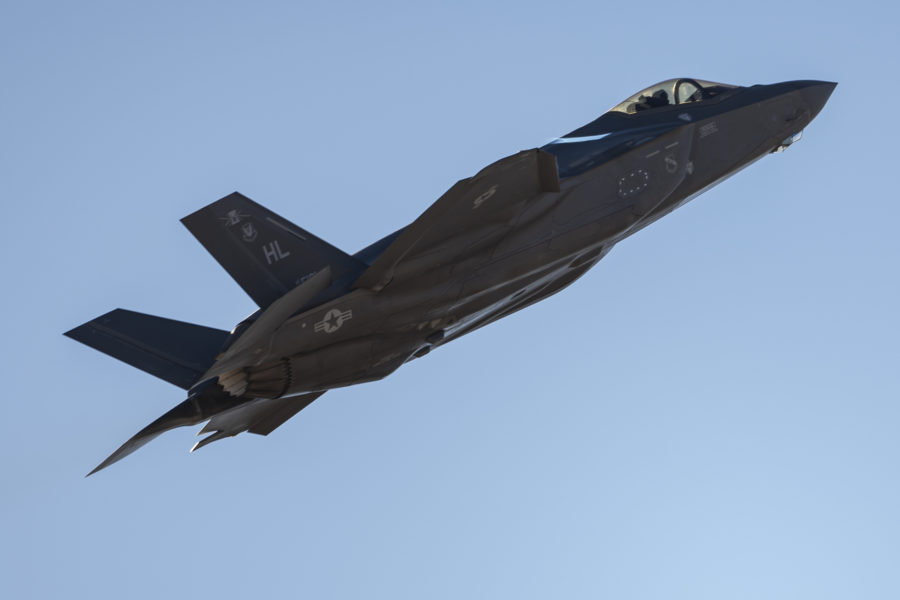President Joe Biden’s $842 billion Defense budget request includes a 5.2 percent pay increase—the biggest in 22 years—“builds the Air Forces needed for the 21st century,” and “increases space resilience,” the administration said.
Topline budget figures released by the White House’s Office of Management and Budget offered scant details; the full budget is to be released March 13.
“The Budget funds the procurement of a mix of highly capable crewed aircraft while continuing to modernize fielded fighter, bomber, mobility, and training aircraft,” the OMB release said. “The Budget also accelerates the development and procurement of uncrewed combat aircraft and the relevant autonomy to augment crewed aircraft. Investing in this mix of aircraft provides an opportunity to increase the resiliency and flexibility of the fleet to meet future threats, while reducing operating costs.”
Air Force Secretary Frank Kendall indicated earlier this week at the AFA Warfare Symposium that the Air Force will buy more F-35 Lighting II fighters than in fiscal 2023, new F-15EX fighters, and more KC-46 Pegasus tankers; it will also invest significantly in the B-21 bomber and Next-Generation Air Dominance systems.
The development and procurement of uncrewed combat aircraft—referred to by the Air Force as Collaborative Combat Aircraft—has been a well-known priority for the service. Kendall recently revealed notional plans to build 1,000 of the drones, which will fly alongside manned fighters.
Air Force generals and civilian leaders have argued CCAs are necessary to build what they call “affordable mass,” giving the service enough aircraft to match an adversary like China while not costing as much as an entirely manned fleet.
Space Force
The White House budget document highlighted funding to improve “the resilience of U.S. space architectures, such as in-space sensing and communications, to bolster deterrence and increase survivability during hostilities.”
Resilience or endurance of space operations under attack, whether by kinetic strikes or electronic jamming, is a defining aspect of Chief of Space Operations Gen. B. Chance Saltzman’s vision for the Space Force. He unveiled his theory of “Competitive Endurance” at the AFA Warfare Symposium, describing it as is a dis-incentivize to deter adversaries from striking first.
The Space Development Agency has emerged as the most high-profile contributor to diversifying the national defense space architecture, developing plans to launch hundreds of satellites into low-Earth orbit in the coming years—including “layers” for sensing and tracking missile launches, as well as for communications, and transporting data.
Budget Fights
The $842 billion topline for the Pentagon would be $26 billion more than the $817 billion appropriated for fiscal 2023—a 3.2 percent increase. Yet in an era of high inflation and increased threats, Congress may well up the ante, as it did in each of the past two years.
House and Senate Republicans will lead that charge. Sen. Roger Wicker (R-Miss.), ranking member on the Senate Armed Services Committee, and Rep. Mike Rogers (R-Ala.), chairman of the House Armed Services Committee, each released statements criticizing defense investment as insufficient.
“The President’s defense budget is woefully inadequate and disappointing,” Wicker said. “It does not even resource his own National Defense Strategy to protect our country from growing threats around the world.”
Rogers called the threats facing the United States “the most complex and challenging … in decades.” The president’s budget request “fails to take these threats seriously,” he added. “A budget that proposes to increase non-defense spending at more than twice the rate of defense is absurd. The President’s incredibly misplaced priorities send all the wrong messages to our adversaries.”
But Biden will have supporters. Sen. Jack Reed (D-R.I.), chair of the Senate Armed Services Committee, praised Biden for crafting a “strong budget,” even as he left open the possibility for change.
“Some will inevitably say the topline is too much, while others will claim it is not enough,” Reed said. “I say America’s defense budget should be guided by our values, needs, and national security strategy. This topline request serves as a useful starting point. I look forward to receiving the detailed budget request so we can get to work crafting a responsible, balanced National Defense Authorization Act.”
